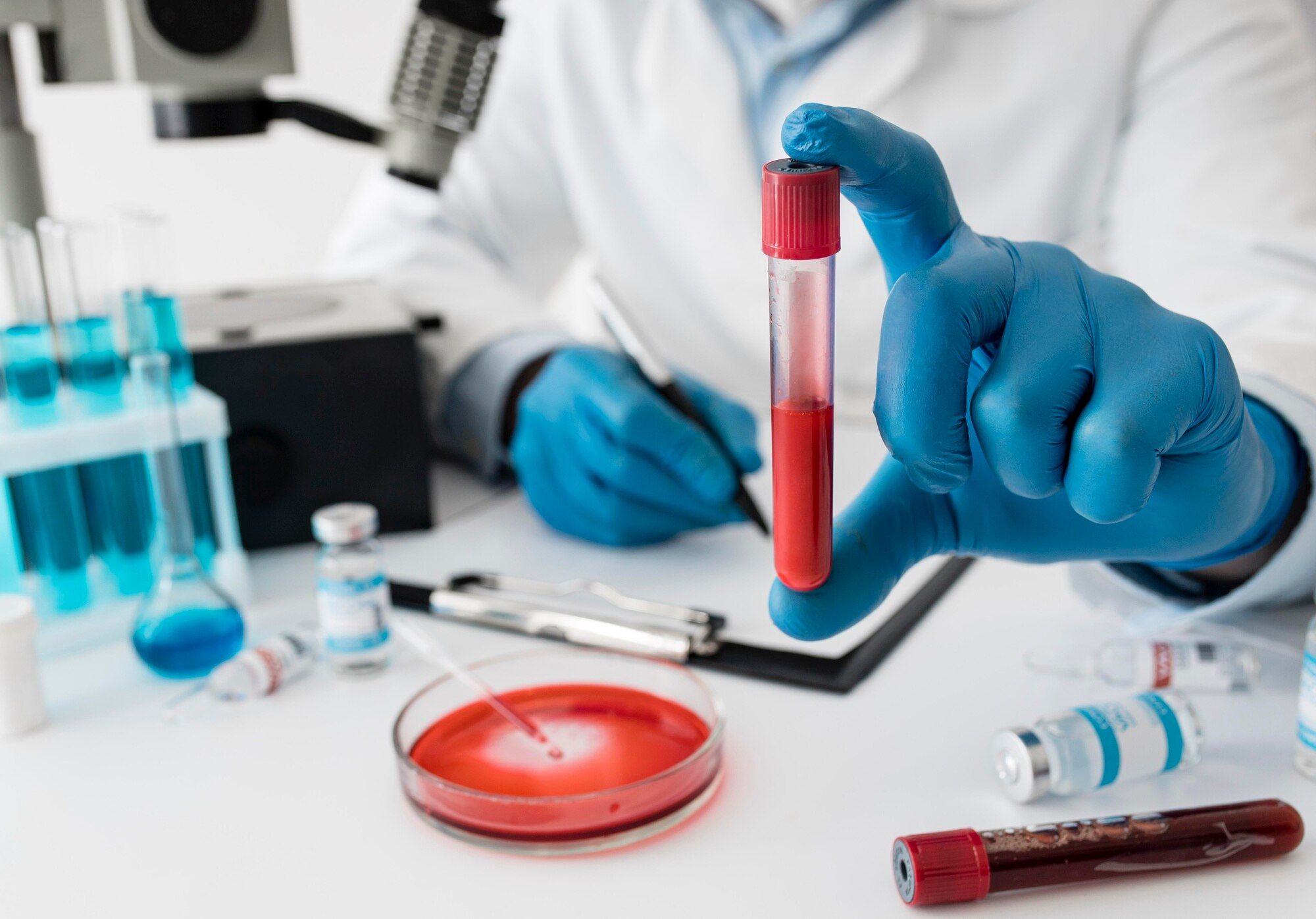General Health
Normal Creatinine Levels By Age: Understanding Kidney Health Across Different Ages
6 min read
By Apollo 24|7, Published on - 19 February 2025
Share this article
0
0 like
%20(1).jpg?tr=q-80)
When it comes to understanding kidney health, one of the most important indicators is creatinine levels. Creatinine is a waste product that results from the breakdown of creatine, a compound used by muscles for energy. Since creatinine is filtered out of the blood by the kidneys, its levels can indicate how well the kidneys are functioning.
In this article, we’ll explore the importance of creatinine test, how its levels vary by age, and what abnormal levels might indicate kidney health. By the end, you'll have a clear understanding of normal creatinine levels by age and why monitoring them is essential for maintaining overall health.
What is Creatinine?
Creatinine is a byproduct of muscle metabolism, created when creatinine is broken down for energy. It is released into the bloodstream and filtered out by the kidneys, exiting the body through urine. Because muscle mass and activity influence creatinine production, levels can vary depending on age, gender, and body composition.
Since the kidneys play a crucial role in eliminating creatinine, any disruption in kidney function can cause creatinine levels to rise, indicating potential kidney issues. Conversely, unusually low creatinine levels may point to muscle-related conditions or other underlying health problems.
Why is Creatinine Testing Conducted?
Doctors often recommend a creatinine test to assess kidney function and identify potential kidney-related issues. Creatinine, a waste product generated from muscle metabolism, is filtered out of the blood by the kidneys. Measuring its levels provides valuable insights into overall kidney health. Here are some common reasons for conducting a creatinine test:
- Monitoring Kidney Function: Individuals with a known kidney condition require regular monitoring to track the progression of the disease and determine the effectiveness of ongoing treatment. A creatinine test helps doctors assess whether kidney function is improving, stabilizing, or deteriorating over time.
- Detecting Kidney Disease: People with risk factors such as diabetes, high blood pressure, or a family history of kidney disease are more susceptible to kidney damage. Regular creatinine testing can help detect early signs of kidney dysfunction, enabling timely intervention and preventive care.
- Evaluating Medication Side Effects: Certain medications, including those used for high blood pressure, pain management, or chemotherapy, can impact kidney function. Periodic creatinine tests help healthcare providers ensure that these medications are not causing harm to the kidneys and adjust dosages or treatment plans if necessary.
- Assessing Muscle Health: Since creatinine is a byproduct of muscle metabolism, abnormal levels may indicate underlying muscle disorders, severe weight loss, or malnutrition. In some cases, unusually high or low creatinine levels can prompt further investigation into muscle-related conditions.
- Post-Transplant Monitoring: After a kidney transplant, it is crucial to evaluate how well the new kidney is functioning. Regular creatinine testing allows doctors to detect any signs of rejection or complications early, ensuring the long-term success of the transplant.
By conducting creatinine tests as part of routine health evaluations or in response to specific medical concerns, doctors can diagnose kidney-related conditions early, make informed treatment decisions, and help maintain overall health.
Who is at Risk of High or Low Creatinine Levels?
Creatinine levels can fluctuate due to various factors, including age, muscle mass, diet, and overall health. Here’s how different groups might experience variations:
- Young and Muscular Individuals: Higher-than-normal creatinine levels may be seen in physically active people or those with significant muscle mass.
- Older Adults: Since muscle mass tends to decline with age, creatinine levels may be lower in elderly individuals.
Infants and Children: Normal creatinine levels in infants and young children are lower than in adults because of their smaller muscle mass. - People with Chronic Illnesses: Malnourished individuals or those with chronic diseases may have lower creatinine levels due to muscle loss.
Normal Creatinine Levels by Age
Creatinine levels are typically measured in milligrams per decilitre (mg/dL) of blood. However, what is considered "normal" varies based on age, gender, and muscle mass. Below are the normal creatinine levels by age:
Normal Creatinine Levels in Adults
Normal creatinine levels in adults are essential indicators of kidney function and help assess the overall health of the kidneys. Here’s the normal creatinine levels for adults:
Normal Creatinine Clearance Levels by Age (mL/min/BSA)
Creatinine clearance is a key indicator of kidney function, measuring how effectively the kidneys filter creatinine from the blood. Normal values can vary based on age, sex, and body surface area (BSA). The typical creatinine clearance levels for different age groups, helping to assess kidney health and detect potential abnormalities are as follows:
1. For Males:
- 19-75 years: 77 - 160 mL/min/BSA
- 2. For Females:
- 18-29 years: 78 - 161 mL/min/BSA
- 30-39 years: 72 - 154 mL/min/BSA
- 40-49 years: 67 - 146 mL/min/BSA
- 50-59 years: 62 - 139 mL/min/BSA
- 60-72 years: 56 - 131 mL/min/BSA
Causes of High Creatinine Levels
Elevated creatinine levels may indicate impaired kidney function or temporary physiological changes. Some common causes include:
- Kidney Disease: Chronic kidney disease (CKD) or acute kidney failure can lead to increased creatinine levels.
- Dehydration: Not drinking enough water can temporarily raise creatinine levels.
- High Protein Intake: Consuming excessive protein, such as red meat, can increase creatinine levels.
- Intense Exercise: Strenuous physical activity can lead to a temporary rise in creatinine.
- Certain Medications: Drugs like NSAIDs, ACE inhibitors, and some antibiotics can affect kidney function and raise creatinine levels.
Symptoms of High Creatinine Levels
In most cases, high creatinine levels do not cause noticeable symptoms until kidney function is significantly impaired. However, signs of kidney dysfunction include:
- Fatigue
- Swelling in the lower extremities (oedema)
- Frequent or decreased urination
- Nausea and vomiting
- Shortness of breath
- Confusion or difficulty concentrating
- Muscle cramps
How is Creatinine Measured?
Creatinine levels are typically measured through:
- Serum Creatinine Test: A simple blood test that measures creatinine levels in the bloodstream.
- Creatinine Clearance Test: This test compares blood creatinine levels to urine creatinine levels collected over 24 hours to assess kidney filtration efficiency.
- Estimated Glomerular Filtration Rate (eGFR): A calculation based on serum creatinine levels, age, gender, and body size to estimate kidney function.
Treatment for Abnormal Creatinine Levels
The treatment for high creatinine levels depends on the underlying cause. Some potential interventions include:
- Managing Kidney Disease: If kidney disease is diagnosed, treatment may involve medication, dietary changes, and lifestyle modifications.
- Hydration: Drinking adequate water can help flush out excess creatinine and support kidney function.
- Dietary Adjustments: Reducing protein intake, especially red meat, may help control creatinine levels.
- Medication Management: If certain drugs are contributing to high creatinine, a doctor may adjust prescriptions accordingly.
- Exercise Moderation: While regular physical activity is essential, excessive exercise may lead to temporary spikes in creatinine.
- Managing Underlying Conditions: Controlling conditions like diabetes and high blood pressure through proper medication, diet, and lifestyle changes can help protect kidney function and prevent further complications.
Conclusion
Monitoring normal creatinine levels by age is essential for assessing kidney function and overall health. Creatinine levels naturally fluctuate based on age, muscle mass, and lifestyle factors. Regular testing can help detect kidney issues early and guide appropriate treatment. If you're at risk for kidney disease or experiencing symptoms, consult your healthcare provider and schedule a creatinine test today to ensure your kidneys are functioning optimally.
General Health
Leave Comment
Recommended for you

General Health
Signs and Symptoms of Vitamin D3 Deficiency: Know What To Look Out For
Vitamin D deficiency is a common condition that can lead to various symptoms and health issues. This article explores the importance of vitamin D, signs of deficiency, risk factors, sources of vitamin D, measurement of vitamin D levels, prevention tips, and potential consequences of untreated deficiency.

General Health
RFT Test: Normal Range, Purpose, Procedure and Results
RFT test normal range helps evaluate kidney health. Understand the importance of renal function tests and what deviations from normal levels indicate.

General Health
10 Most Googled Questions On Thyroid Answered By An Apollo Expert
The thyroid gland is responsible for metabolism, growth, and several other important functions. Read to know how abnormal functioning of this gland can affect your overall well-being.
Subscribe
Sign up for our free Health Library Daily Newsletter
Get doctor-approved health tips, news, and more.
Visual Stories

Plant-based Foods That Are a Great Source of Iron
Tap to continue exploring
Recommended for you

General Health
Signs and Symptoms of Vitamin D3 Deficiency: Know What To Look Out For
Vitamin D deficiency is a common condition that can lead to various symptoms and health issues. This article explores the importance of vitamin D, signs of deficiency, risk factors, sources of vitamin D, measurement of vitamin D levels, prevention tips, and potential consequences of untreated deficiency.

General Health
RFT Test: Normal Range, Purpose, Procedure and Results
RFT test normal range helps evaluate kidney health. Understand the importance of renal function tests and what deviations from normal levels indicate.

General Health
10 Most Googled Questions On Thyroid Answered By An Apollo Expert
The thyroid gland is responsible for metabolism, growth, and several other important functions. Read to know how abnormal functioning of this gland can affect your overall well-being.